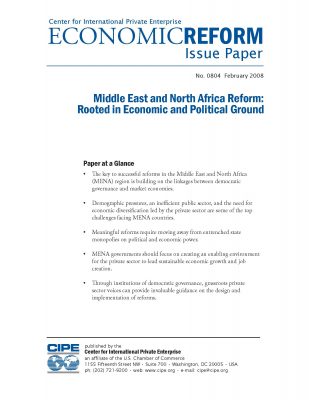 Paper at a Glance
Paper at a Glance
• The key to successful reforms in the Middle East and North Africa (MENA) region is building on the linkages between democratic governance and market economies.
• Demographic pressures, an inefficient public sector, and the need for economic diversification led by the private sector are some of the top challenges facing MENA countries.
• Meaningful reforms require moving away from entrenched state monopolies on political and economic power.
• MENA governments should focus on creating an enabling environment for the private sector to lead sustainable economic growth and job creation.
• Through institutions of democratic governance, grassroots private sector voices can provide invaluable guidance on the design and implementation of reforms.
Published Date: February 26, 2008
